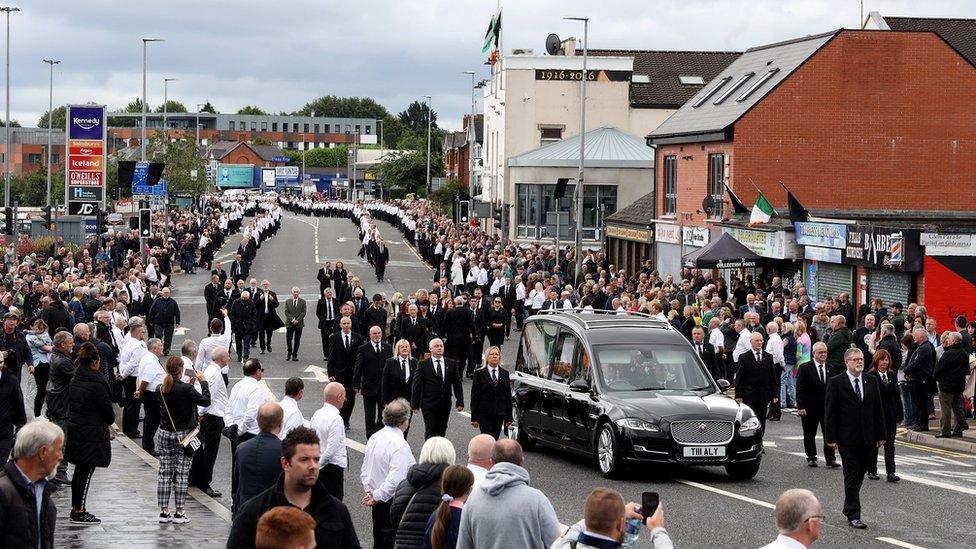Bonfire banners 'sectarian and offensive', says Foster
- Published
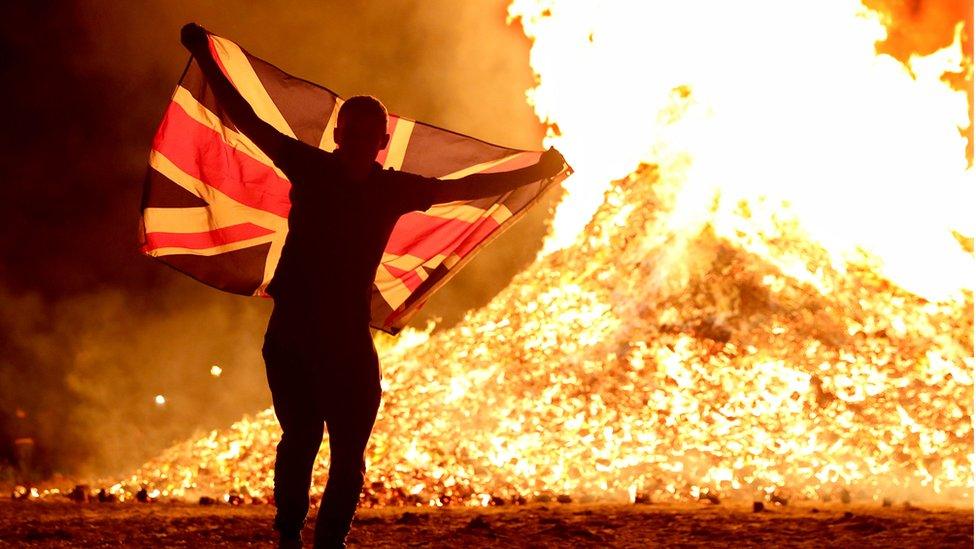
A number of bonfires on Saturday night attracted hundreds of people
Northern Ireland First Minister Arlene Foster has criticised people who placed "sectarian and offensive messages" on top of Eleventh Night bonfires.
Sinn Féin MP Paul Maskey said he filed a complaint to the police about a "vile banner" targeting veteran republican Bobby Storey, who died last month.
Mrs Foster also said she had "regret" that some people did not abide by the NI Executive's Covid-19 regulations.
She repeated her call for people to celebrate the Twelfth "at home".
A number of bonfires in Belfast had banners referencing Mr Storey, which Paul Maskey described as "a series of blatant and unacceptable displays of sectarian hatred on bonfires yet again".
He said "it is absolutely disgraceful" that the grief of Mr Storey's family is being "compounded by sectarian thugs".
Mrs Foster told BBC NI's Sunday Politics that those involved should question "what sort of a Northern Ireland do they want to live in?"
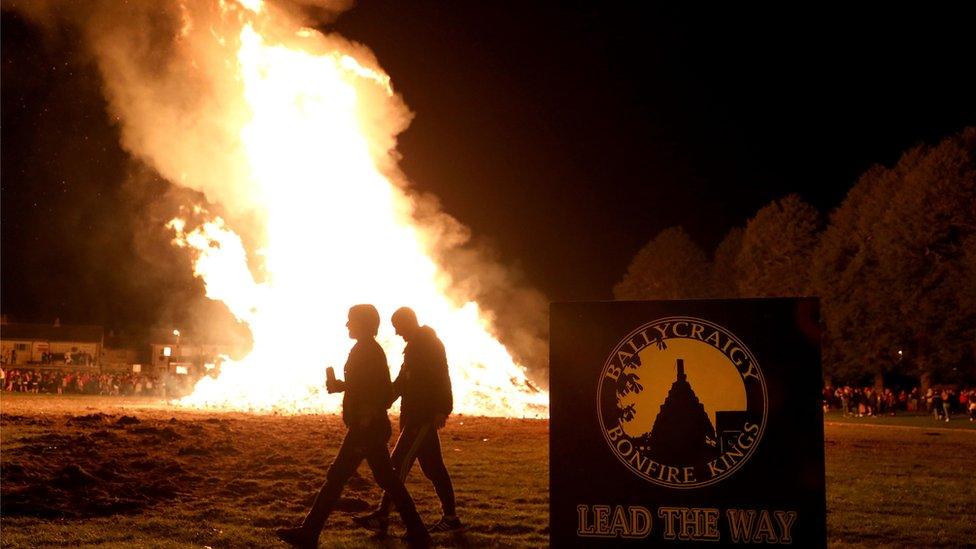
Mrs Foster said she regretted that social distancing guidelines were not obeyed at some bonfires
"I know certainly the one in which I want to live in," she continued.
"One where we can all proudly celebrate, but do so in a way that is not offensive and certainly not sectarian."
Deputy First Minister Michelle O'Neill called on political unionism to "do more to challenge and confront" the issue of bonfires, tweeting they were "detrimental to the environment, but also to community relations".

Allow X content?
This article contains content provided by X. We ask for your permission before anything is loaded, as they may be using cookies and other technologies. You may want to read X’s cookie policy, external and privacy policy, external before accepting. To view this content choose ‘accept and continue’.

Fires were lit in loyalist areas across Northern Ireland on Saturday night with crowd numbers in the hundreds at some of the pyres.
The executive's guidance currently has a limit of up to 30 people gathering outdoors.
Meanwhile, Northern Ireland's Health Minister Robin Swann has urged people to adhere to social distancing measures.
"We've seen a few, a minor number of occasions last night where those were broken, not in the expectations or not on the level that people were expecting," he said.
"Don't set your standards by what you see in others," he added.
He said Ballymena District having a drive-in service on Sunday was an example of a way to celebrate in a way that is permissible under the regulations.
'Celebrate at home'
Between 18:00 BST on Saturday and 01:00 on Sunday, the fire and rescue service said it responded to 24 bonfire-related incidents.
This was a fall of 29.5% based on the same period in 2019.
The Orange Order, which does not organise bonfires, had urged people to forego the tradition as they can attract large crowds.
The organisation has cancelled its traditional Twelfth of July parades due to the risks from coronavirus and urged people who want to celebrate to do so "at home".
The Parades Commission said it had been notified of more than 250 parades being held by individual bands between 11 and 13 July.
The annual events mark the victory of the Dutch-born Protestant King William III over Catholic King James II at the Battle of the Boyne in July 1690.
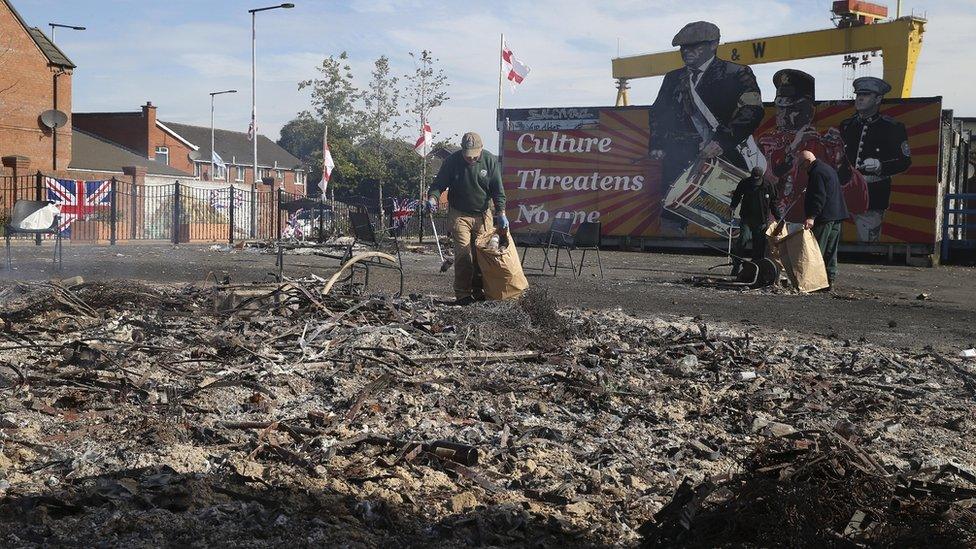
People clearing up after a bonfire on the Newtownards Road
Social distancing
In a reference to Bobby Storey's funeral, which has caused division in the NI Executive due to the attendance of Deputy First Minister Michelle O'Neill and Finance Minister Conor Murphy, Arlene Foster said she understood the frustration of many people who want to celebrate the Twelfth of July.
The funeral attracted a large crowd of mourners in west Belfast, although the Sinn Féin ministers maintain they did not break Stormont's regulations on social distancing.
Repeating her call for people who want to celebrate the Twelfth of July to do so "at home" and avoid large gatherings, Mrs Foster added: "They say well, hold on, if that can happen there why can't I do it, but you have to remember you shouldn't just fall below the standard required of the community just because others do it.
"It's important to remember why we have the socially distanced guidelines in place.
"They're there to protect the community, they're there to protect our family, our elderly relatives and people need to remember that."
- Published11 July 2020
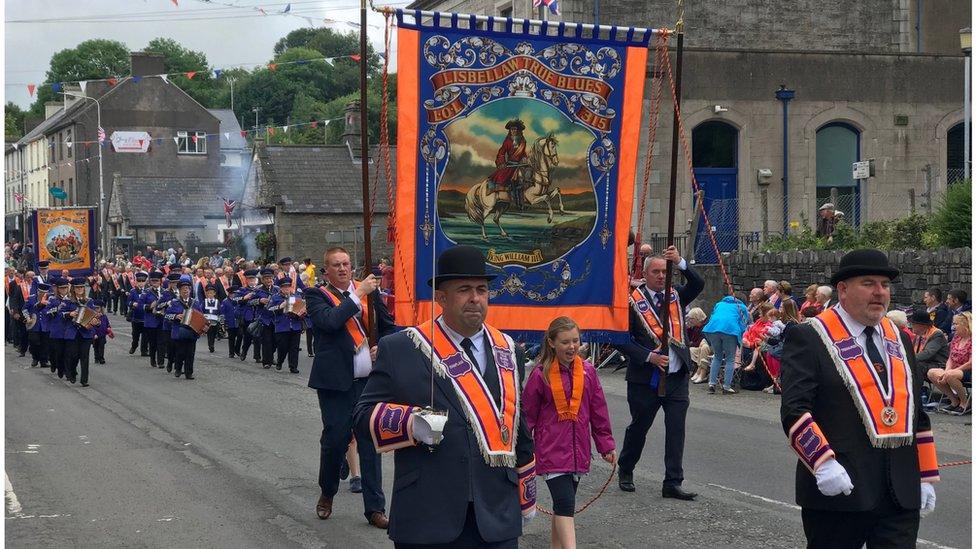
- Published6 April 2020

- Published14 May 2024
